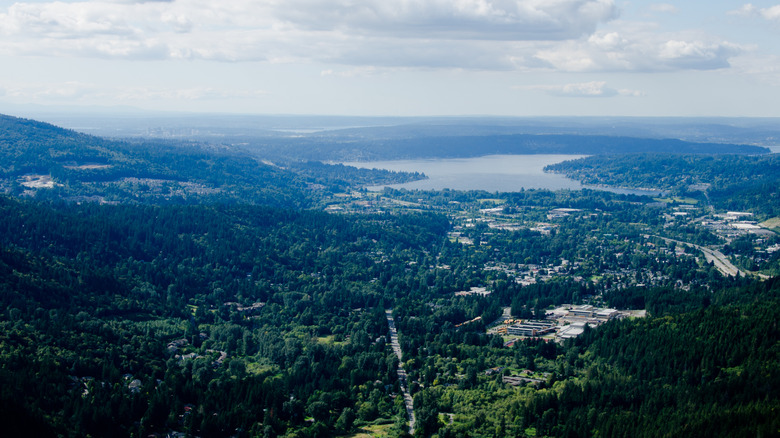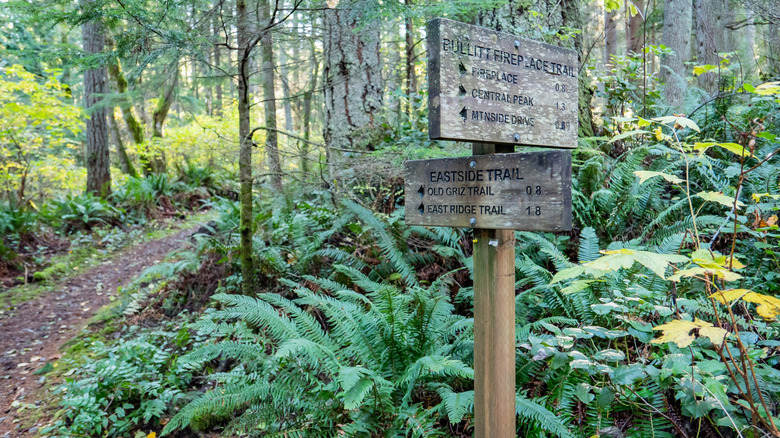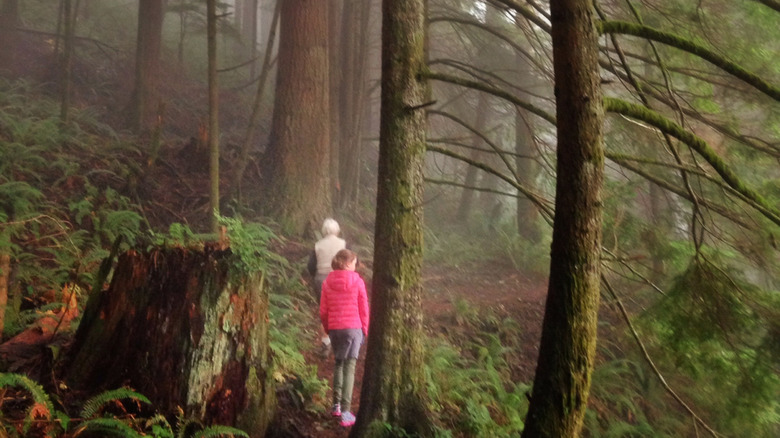The Gateway To Seattle's Alps Is This 'Trailhead City' With Year-Round Outdoor Recreation On Easy Trails
When someone is comparing a location in the United States to Europe's Alps, they usually talk about places like Park City, Utah — a world-renowned ski resort and one of the prettiest mountain towns in the country. However, over in the western foothills of Washington state's Cascade Range — not far from the famously beautiful Cascade Loop drive — a series of publicly preserved peaks and woods have been referred to as Seattle's Alps or the Issaquah Alps for almost 50 years. The city of Issaquah sits at the base of these majestic hills and is a great place to visit for the year-round outdoor recreation the landscape offers.
Just 20 minutes from downtown Seattle and half an hour from Seattle-Tacoma International Airport, Issaquah is an easily accessible location that offers equal amounts of refined culture and rugged outdoor experiences. Formally established as a city in 1899, Issaquah has long welcomed visitors to its dramatic landscape of bogs, woods, streams, lakes, and peaks.
This is the real draw of Issaquah, which bills itself as "Trailhead City." It's an appropriate name given the local efforts that have gone into making the Issaquah Alps one of the greatest examples of public forest lands in the entire country.
Easy hiking through hundreds of miles of Issaquah Alps trails
All told, the Issaquah Alps comprise over 15,000 acres of forested lands within the Cougar, Squak, and Tiger Mountains, as well as land on nearby Grand Ridge and Taylor Mountain. There are over 200 miles of trails weaving throughout this landscape of conifers, wild mushrooms, waterfalls, streams, lakes, ponds, and wildflower meadows.
These protected lands were the brainchild of Harvey Manning, a Washington native, author, trail guide, and ceaseless advocate for preserving public lands. He coined the term "Issaquah Alps" and helped establish the Issaquah Alps Trails Club (IATC) in 1979. The club continues to protect, maintain, and grow awareness of these beautiful trails just outside the trendy, eccentric, artsy neighborhoods of Seattle, like Fremont.
The IATC offers guided hikes through the myriad trails in the system. Two of the best for beginners are Park Pointe (two miles) and Rainer (1.5 miles), which cut right through the middle of 100 acres of preserved land in Issaquah city. A more difficult trail that yields amazing views of Mount Rainier is Margaret's Way, a 6.5-mile round trip 1,500 feet up Squak Mountain. This trail was named in honor of trails advocate Margaret MacLeod. Most of the mountains barely peak at 3,000 feet, making trails far easier than others you will find in the Cascade Range.
Issaquah Alps outdoor recreation for every season
The additional beauty of the Issaquah Alps is that they can be accessed at any time of the year for a number of different outdoor activities. Winters are mild, with an average of about eight snow days per year. Trails can be easily accessed via snowshoes, though those looking to ski or snowboard would do better to check out the nearby Summit at Snoqualmie for access to proper slopes.
Winter may be accessible, but it's spring, summer, and fall that yield the most opportunities for outdoor recreation. Mountain biking and horse riding are allowed on certain trails within the Issaquah Alps, except the Cougar/Squak Corridor, a 730-acre valley connecting Cougar Mountain Regional Wildlife Park and Squak Mountain State Park. Anglers will rejoice, too! Creekside Angling Company offers fly fishing adventures around the area, which is prized for its runs of salmon and various types of trout.
Nearby Lake Sammamish State Park is a great place to swim, fish, or paddle. If you don't have a boat of your own, you can easily rent one from Issaquah Paddlesports. If you're planning on visiting around Labor Day, the Issaquah Alps are an excellent spot to beat the intense crowds of Seattle.


